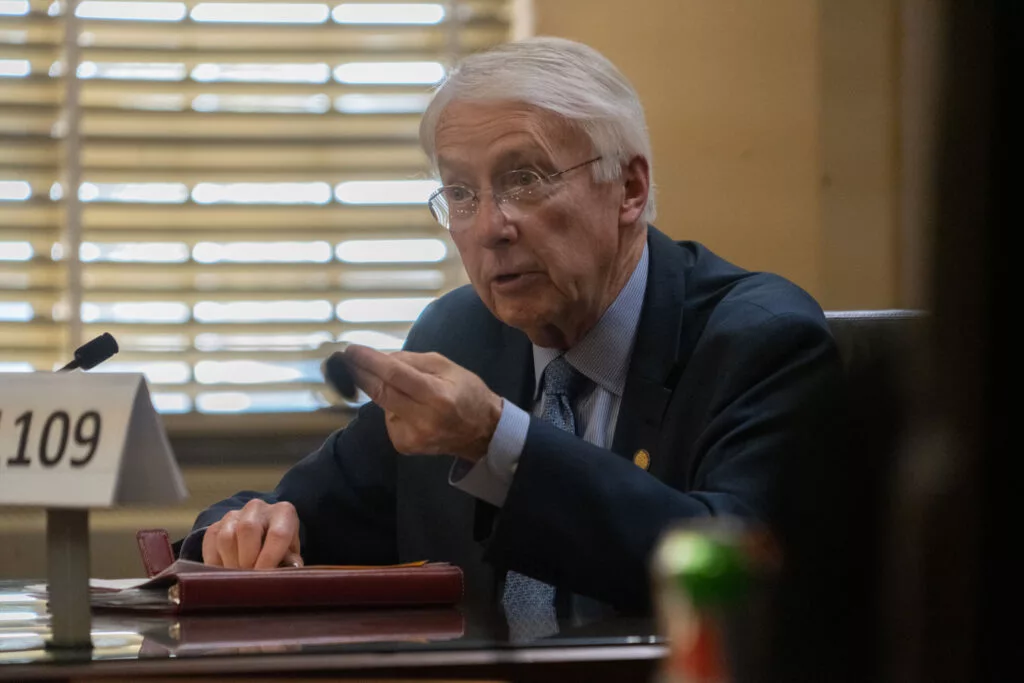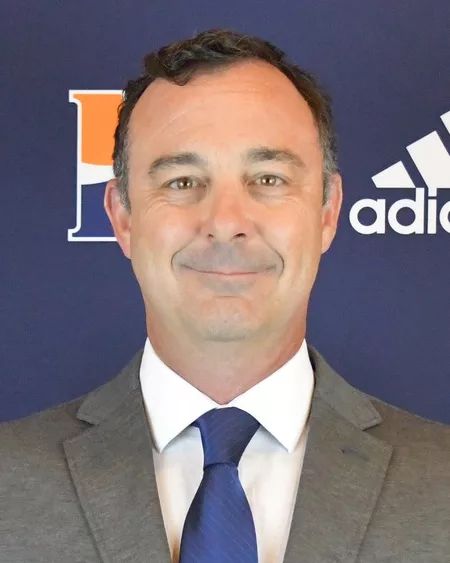
Zach Wendling
Nebraska Examiner
LINCOLN — After working behind the scenes to revive a stricter abortion ban last year, a Nebraska lawmaker said Thursday he should have fought for an additional exception and a repeal of criminal penalties.
State Sen. Merv Riepe of Ralston introduced Legislative Bill 1109 this year in hopes of adding an exception for fatal fetal anomalies, up to 20 weeks post-fertilization, in line with other exceptions for incest and sexual assault, which were included last year. At least two physicians would need to confirm a fatal diagnosis, determining the pregnancy would result in the infant’s death at birth or “inevitably thereafter.”
LB 1109 would also repeal criminal penalties for someone who intentionally or recklessly performs, or attempts to perform, an abortion in violation of state law. This penalty is currently a Class IV felony. Patients are not held liable for abortions performed or attempted illegally.
“I failed last session to hold to my expectations, and we have an incomplete law,” Riepe told the Judiciary Committee. “I feel compelled to right a wrong.”
‘I made a mistake’
Riepe said current criminal penalties penalize doctors following the law but “operating within the margins” while the additional exception is for mothers who have “done everything right.”
“They are want-to-be mothers. They have sought prenatal care and screening,” Riepe said. “But the genetic lottery has swatted them down, and they have lost.”
Riepe originally proposed both provisions in an amendment to Thurston State Sen. Joni Albrecht’s LB 626, a near-total abortion ban, last year. However, he did not get a vote on his amendment, and he opted to be “present, not voting” during the bill’s second-round debate.
While Riepe supported the bill through first-round debate, his action on second-round debate effectively killed a stricter bill, though Riepe and other lawmakers returned just weeks later with an alternative proposal that revived a stricter ban at 12 weeks gestational age, seeking to attach it to LB 574.
The move was “quickly” put together, finalized in Riepe’s office with Gov. Jim Pillen, the senator testified Thursday, and the measures were ultimately merged and passed into law.
“I made a mistake by not holding to the amendment I had proposed on the floor during the heated LB 626 debate,” Riepe said. “Had I done so, we would not have this hearing today.”
‘Short end of the stick’
Tiffany Palmer spoke in favor of LB 1109 at Thursday’s hearing, describing her experience in 2018 when, after learning she was expecting a second child, she later received a terminal diagnosis of Trisomy 18. The anomaly can lead to stillbirth or death of the infant within about one year.
Palmer said she previously defined abortion as being an option for a mother who did not want her child.
She now feels medical termination should be an option for mothers whose children will not live outside the womb, saying they need time “to process the hands that they’ve been dealt.”
“Until you’ve lived it, you cannot comprehend the magnitude of the situation,” Palmer testified.
“When thinking about abortion, please understand it’s not only for the unwed mothers who had a one-night stand,” Palmer added. “It’s a health care option for those who want a child, but nature gave them the short end of the stick.”
Lynn Zeleski of Norfolk, who was joined by her husband, Sam, also spoke in support of Riepe’s bill.
Lynn Zeleski described a terminal pregnancy in 1982 when one of her eggs with no chromosomes was implanted with multiple sperm. Sam Zeleski said it brought his wife to “death’s door,” and he asked lawmakers to think about what they would do if they were in the Zeleskis’ situation.
Only the timeline changes
Dr. Robert Bonebrake, a maternal-fetal medicine specialist in Omaha, testified against Riepe’s bill, noting that he has cared for more than 15,000 women, walking some through the tragedy of a baby who won’t survive.
He cautioned, however, that not all fatal fetal anomaly diagnoses are correct and said he has been wrong at times. He said he still receives holiday cards from people he diagnosed incorrectly as having fatal fetal anomalies.
Bonebrake added that moving up the timeline for grief does not make the situation easier.
“The death of a child, regardless of when it occurs, only changes the timeline, not the degree of sorrow or the pain,” Bonebrake testified.
Callie Higgins testified in opposition as well, describing her fatal fetal diagnosis at about 20 weeks. Though her son, Archer, lived for only 26 hours after being born, she said, he snuggled and made cooing noises in the arms of his parents, responding to their voices, before his death.
Though the time was short, Higgins said, she is thankful for the time and memories she had with him.
Dawn Sanford similarly described her baby’s fatal diagnosis of anencephaly and said families need time to process and plan after such a diagnosis. Had she terminated her pregnancy, she said, she would not have the photos or memories of her child.
“Yes, he only lived three hours and 44 minutes, but he probably had more love than some children have in a lifetime,” Sanford testified.
The Nebraska Catholic Conference, Nebraska Family Alliance, Nebraska Right to Life and campus chapters of Students for Life Action at the University of Nebraska-Lincoln and University of Nebraska Medical Center were among those who testified against Riepe’s bill.
Medical association divided
Dr. John Trapp, a pulmonary critical care physician and president of the Nebraska Medical Association, testified that his association supports removing criminal penalties as a “step in the right direction” but said it was neutral on the fatal fetal anomalies language due to limited applicability.
“Many patients with complex and high-risk pregnancies would not fall clearly within the definition of ‘fatal fetal anomaly,’” Trapp testified.
Riepe asked State Sen. Ben Hansen of Blair, the author of the final LB 574 amendment last year and chair of the Health and Human Services Committee, to work with him on repealing criminal penalties. Hansen committed to do so.
However, Riepe said, the bill was sent to the Judiciary Committee and not the HHS Committee, which he is a member of, so Hansen’s help would come only if LB 1109 advances to the full Legislature from committee.
2024 petition campaign
Andi Curry Grubb of Planned Parenthood North Central States, testifying in a neutral capacity, said Nebraskans shouldn’t debate abortion access year after year but should “entirely” reject such restrictions. She said they could through the “Protect Our Rights” petition drive, which seeks to protect access to abortion up until fetal viability through a ballot initiative.
Riepe testified that he wouldn’t take a position on the petition drive. He told the Nebraska Examiner that if his bill is rejected, it has the potential of “firing up” abortion-rights proponents.
“Legislatively, if they vote against this, they’re voting to give preference to a non-viable infant over a living, want-to-be mother whose health and even life may be in jeopardy,” Riepe said after the hearing. “I think that’s a horrible public relations place to be in as a state.”
The committee took no immediate action on LB 1109.








